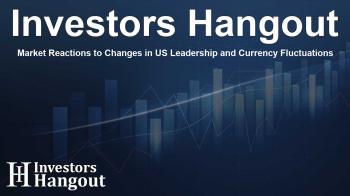Market Reactions to Changes in US Leadership and Currency Fluctuations

Gold Shines Amidst Softening US Dollar
Gold prices showed resilience, experiencing a 0.24% increase, buoyed by a softer US dollar. As investors assess the potential economic repercussions of newly appointed leadership, there is notable volatility in the markets.
“Increased market volatility often supports safe-haven assets like gold,” observed an analyst, reflecting on the anticipated shifts in economic policy.
Despite the gains, there are underlying pressures from proposed trade policies that could influence the price of gold. With new tariffs being discussed, there are genuine fears about inflation rising, which might deter investors from non-yielding assets.
Current thoughts on trade tactics include a possible range of tariffs, including substantial duties on imports from specific nations. Analysts warn that these strategies could elevate consumer prices, increasing inflation expectations. The consensus seems to hover around a singular or couple of interest rate reductions anticipated by the Federal Reserve, primarily due to these inflation worries.
As gold prices rallied significantly in the early trading hours, the weakening of the US dollar prompted markets to react favorably. Observers noted that the absence of immediate tariff announcements contributed to a sense of relief among traders.
“Potential breakthroughs around the $2,728 mark could push the gold price even higher,” shared another expert, hinting at positive market trends.
The Euro's Surge Following Policy Uncertainties
The euro experienced a significant uptick against the dollar, rising by 1.39%. The absence of immediate trade tariffs from the new administration allowed for a rally in currencies closely linked to the US economy.
Traders had braced for potential tariff announcements that could reshape market dynamics. However, when this did not materialize, the dollar's value began to dip, showcasing how sensitive currency markets can be to political maneuvers.
“The current fluctuations in currencies signify a reaction to unanticipated policy decisions and their potential impacts,” indicated a market strategist.
Conversations about remedying trade imbalances suggest various remedies, including tariffs and increased purchases of energy exports. Yet, the eurozone still grapples with economic challenges, and the market remains cautious amidst ongoing uncertainty regarding future policy directions.
With its current performance, the euro zone’s economy is intertwined with energy costs and monetary policies that could diverge from recent trends in the US, demonstrating the intricate connectivity of global economic systems.
Relief Rally Boosts Canadian Dollar
The Canadian dollar also had a favorable day, gaining 1.22% against the US dollar. Traders attributed this increase to a broader ‘relief rally’ rooted in the absence of anticipated trade tariffs.
This rally signifies a closing of bullish bets made on the dollar, as a lack of immediate trade costs has invigorated other currencies. However, uncertainties remain regarding potential long-term impacts on the Canadian economy.
Recent statements from leadership about imposing tariffs on imports from Canada have raised red flags among traders, creating concerns about possible economic impacts. If tariffs are executed, particularly on oil, it could provoke further volatility in exchange rates.
As the Canadian dollar works to recover prior losses, ongoing developments in government policies are essential for market participants to watch. Especially with upcoming economic data releases, traders might soon have new insights that could influence market traction significantly.
Market Insights Moving Forward
As markets continue to react to shifts in policy and leadership, investors remain observant. The interplay between commodity prices, currency valuations, and potential government interventions illustrates the complexity of today’s economic landscape.
Staying informed about macroeconomic indicators and developments in the political landscape will be vital for investors. Participation in the market demands agility and understanding of both local and global economic narratives.
Frequently Asked Questions
What has caused the recent rise in gold prices?
The recent rise in gold prices is attributed to a weakening US dollar, political uncertainty, and the demand for safe-haven investments amid market volatility.
How is the Canadian dollar affected by US policies?
The Canadian dollar is influenced by US policies, especially concerning tariffs and trade agreements, which can impact import costs and economic relationships.
What are analysts saying about the future of the euro?
Analysts indicate that while the euro has seen short-term gains, ongoing economic challenges within the eurozone could pose risks in the long term.
Are there risks associated with the proposed tariffs?
Yes, proposed tariffs could increase inflation and production costs, influencing currency values and ultimately impacting consumer prices.
What strategies are recommended for navigating currency fluctuations?
Investors are advised to stay informed about macroeconomic trends and political developments, using this information to adjust their investment strategies accordingly.
About The Author
Contact Evelyn Baker privately here. Or send an email with ATTN: Evelyn Baker as the subject to contact@investorshangout.com.
About Investors Hangout
Investors Hangout is a leading online stock forum for financial discussion and learning, offering a wide range of free tools and resources. It draws in traders of all levels, who exchange market knowledge, investigate trading tactics, and keep an eye on industry developments in real time. Featuring financial articles, stock message boards, quotes, charts, company profiles, and live news updates. Through cooperative learning and a wealth of informational resources, it helps users from novices creating their first portfolios to experts honing their techniques. Join Investors Hangout today: https://investorshangout.com/
The content of this article is based on factual, publicly available information and does not represent legal, financial, or investment advice. Investors Hangout does not offer financial advice, and the author is not a licensed financial advisor. Consult a qualified advisor before making any financial or investment decisions based on this article. This article should not be considered advice to purchase, sell, or hold any securities or other investments. If any of the material provided here is inaccurate, please contact us for corrections.

